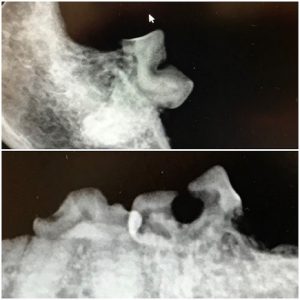 February is pet dental health month, so let’s talk about dental disease in cats. Cats are notorious for hiding signs of illness or pain, and being smart enough to disappear when the cat carrier comes out for a visit to the vet! For these reasons many cats do not go to the vet regularly for checkups and therefore significant dental disease often goes unnoticed.
February is pet dental health month, so let’s talk about dental disease in cats. Cats are notorious for hiding signs of illness or pain, and being smart enough to disappear when the cat carrier comes out for a visit to the vet! For these reasons many cats do not go to the vet regularly for checkups and therefore significant dental disease often goes unnoticed.
Dental disease can certainly cause pain, but our feline friends don’t always express pain the way we would expect. Oral pain in cats sometimes causes visible signs like drooling or difficulty chewing. But very often the only sign of oral pain is hiding, lethargy, being less playful and possibly gradual weight loss. Cats generally do not like having their mouths looked at so it can be difficult for owners to see what is really going on.
Cats can develop several different types of dental disease. Periodontal disease involves buildup of bacterial plaque and tartar on the surface of the teeth, which in turn causes gum irritation and eventually bone loss and loosening of tooth roots.
But of course cats, being mysterious creatures, have their own special type of dental problem known as tooth resorption. In this disease, a cavity- like erosion of the tooth begins under the surface in the root, and eventually the visible part of the tooth becomes eaten away. Tooth resorption is painful and extremely common; according to specialists, up to 67% of cats will experience this in their lifetimes. The cause of this syndrome is unknown and more than one tooth is often affected. Dental x-rays under anesthesia are the best way to diagnose this problem if your veterinarian suspects an issue at Kitty’s physical exam. If resorptive lesions are found, the treatment would involve removal of the tooth because there is no way to stop the erosive process once it starts.
Home dental care such as tooth brushing can help prevent dental disease, and cats can be trained to cooperate and even look forward to it! Cats understand mutual grooming, and positive reinforcement with treats can strengthen the bond with your cat. Oral care diets can also be an effective part of home dental care if recommended by your vet.
Your cat deserves to have healthy, pain free teeth! Hidden dental disease is just one reason why regular veterinary exams for cats are so important. If your cat hasn’t been to the vet in a while, why not treat him to the gift of health and comfort this year!

